Masturbating Journalist Assertion Clarified
“I ought to correct the record: I said ‘masturbatory’, not ‘masturbating’. Glad that’s cleared up.”
Jobs, Jobs, Jobs
US unemployment rate pic.twitter.com/NFGZ62i6GK
— cigolo (@cigolo) May 2, 2014
Unemploy rates by education: No high school degree (8.9%), HS degree (6.3%), 2 yr deg or some college (5.7%), college+ (3.3%)
— Zachary Goldfarb (@Goldfarb) May 2, 2014
Labor force participation collapsed back to 62.8%…where it was in the late ’70s. pic.twitter.com/qRyTLO0kGb
— Matt Phillips (@MatthewPhillips) May 2, 2014
@MatthewPhillips Get ready for further collapse: pic.twitter.com/AF3LMEuU9b
— kevin kane (@kevinjosephkane) May 2, 2014
Almost there! After April, we’re just 120K jobs away from recovering all the jobs lost in the Great Recession! pic.twitter.com/yzkGcm2rH3
— Matt Phillips (@MatthewPhillips) May 2, 2014
And we still have about zero net job growth over the past seven years.
— Annie Lowrey (@AnnieLowrey) May 2, 2014
The Books They Left Behind
by Casey N. Cep
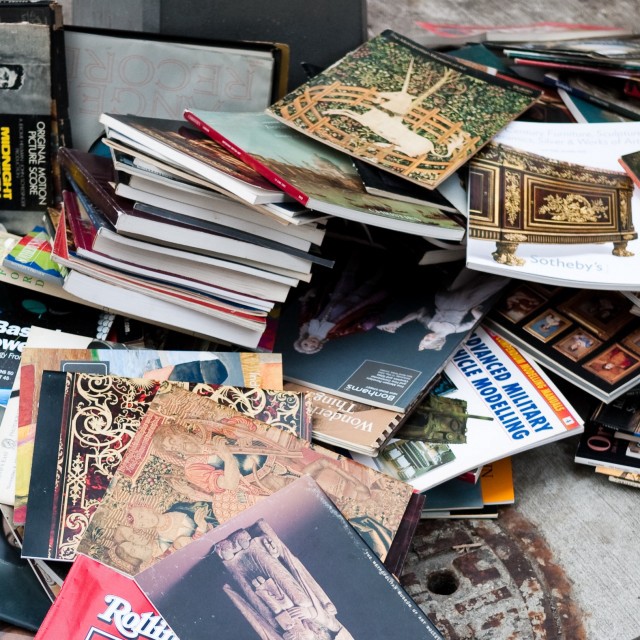
Big, bold Wallace Stevens rests there in his entirety, several pages dog-eared with the poems you wanted me to read. There is the copy of Flannery O’Connor’s stories that I can only open if I turn past the title page where, in black loopy ink, your well wishes wave. There is the paperback of Leaves of Grass that has no name on the inside cover, but I know it belonged to you. There is the cheerful, brightly colored edition of Goodbye, Columbus that is always trying to say hello with tennis courts and swimming pools on the first page; your definition of what it meant to be rich.
These are some of the books haunting my shelves. There are the authors whose books have outlived them, and former owners whose used books were bargains, but those ghosts are mostly strangers. The ghosts who truly haunt are the ones we knew. Long after the passwords were changed and the clothing was sent back, the digital connections severed and the heirlooms returned, the books remain. I wonder about what to do with them.
Dante does not say that Francesca and Paolo kept reading in hell. Their book, I suppose, did not make the descent. I like to think that Sigismondo kept the copy of Lancelot and Guinevere that turned their eyes into magnets and their hearts into wax. “The book and writer both / Were love’s purveyors,” Francesca says. And so it was for me, many times now.
Love is a snake that is always shedding its skin. And while I have no trouble clearing away most of what has been sloughed off, books have always been the skins that I cannot discard. Why get rid of them when it is not the bindings but the stories that have been stained? I cannot read The Old Man and the Sea without remembering reading it to you in the car on our own adventure across some other sea, neither of us quite sure what it meant to dream of lions. And it isn’t my voice but yours that I hear in my head now when I remember little bits of The Four Quartets.
We can wash a shirt, but we cannot wash a book. We can repaint walls or reupholster furniture, but we cannot change the color of a novel or the pattern of a poem. Even if we obey the etiquette of ending things, returning the books that were borrowed and taking back the ones we lent, there are still the ones that were given. I don’t want to be Sigismondo holding onto the Arthurian legends long after Lancelot is being read with someone else, and yet hell would be to live without ex-books.
So keep ex-books long after your exes are gone. For some time, I have felt that was the only advice missing from the sort dispensed to broken hearts. A few have said, “There is nothing special about books. They are just like the cities where lovers lived together or the restaurants where they ate breakfast and lunch and dinner; you move if you cannot stand them or move on if you can.” But while you can leave a city or change your diet or find a new way to walk to work, you cannot alter books, even if you pull them from your shelves.
What to do about our haunted shelves then? Every book is associated with someone — siblings, friends, parents, professors, booksellers, even strangers — but the ones joined to exes haunt in a way that even the dead do not. I suspect that is why books are never on the lists of things that broken hearts are told to return. I don’t even keep mine separated on the shelves. These ghosts are with all the others, sandwiched between course books and bibles and galleys and all the rest.
I asked a friend once about returning some books to an ex, and she said no, you must keep them; then I asked about tearing out the inscriptions, and she said no, again; they are all talisman, she told me, and so they would have their power even if I threw away their inscriptions. She was right. Whether or not I ever open the page, I know the words are there, and even if I had torn them out, I would still remember what they said.
Casey N. Cep is a writer from the Eastern Shore of Maryland.
Photo by Charley Lhasa
New York City, April 30, 2014

★★★★ Raindrops streaked the windows, and behind them were occasional snowflakes plunging by. The first-grader’s sneakers were on before anyone remembered the existence of the rain boots, then remembered that they were up on a shelf in the clothes closet. The rain was light, at the moment, and the first-grader agreed he’d rather walk quickly through it without an umbrella than slowly with an umbrella. A steady file of parents and children arrived late, their morning routines in damp disarray. By late morning the rain was no longer light; it spilled through the scaffold outside the apartment lobby before a hood could be raised against it. Tiny choppy wavelets blew across a street puddle. A woman wrestled with an inside-out golf umbrella, which probably served her right. Rain was splatting down into the subway tracks where the sunbeams had been falling days before. Water drained from the roof of a UPS truck and fountained from an outlet midway down its rear corner. Cars and trucks and taxis were gunning their engines or forcing their way through crosswalks, as if they were the ones who weren’t waterproof, as if the cold wind were hurting steel and glass. A delivery truck, a bottled-drinking-water delivery truck, threw itself forward to block the box and the crosswalk together. The rain accumulated and accumulated, grand in its relentlessness. The landing of the subway stairs was flooded; the crosswalks were flooded. Around Times Square, in the late afternoon, a few fans still huddled outside a stage door. Umbrellas clustered outside a ramen shop by 10th Avenue, where the umbrella-holders waited for the CLOSED sign to flip to OPEN at 5. In the time it took to get through two shared deep bowls of soup, the two better-grade bodega umbrellas, hooked side by side over the edge of an umbrella bucket, had come unhooked and separated. After much rummaging, the second turned up, completely sodden, at the bottom of the other umbrella bucket. Out in the unending downpour, the umbrella handle thrummed with the vibrations of the rainfall. The avenue was gridlocked, the traffic more maddened than before. Nothing made sense but the rain. It was pouring rain down inside the 50th Street station, on the platform. The ground and street above were a discredited notion. Sneakers were saturated, pants soggy to the knee. At home, once the waterlogged things were finally stripped and cast off, wet footprints traced the route into the bedroom, all five toes distinct.
A Poem By Susan Lewis
by Mark Bibbins, Editor
The Original Self-Pleasure Equation
& other inconsiderate lilies. Or any mineral aspiring to ambulate. Which is not to say living in close quarters. Leaves rubbing & rustling, promiscuous breeze egging them on. To carry on tastefully until the bitter end. To stay on the lookout for aught nubile in negligée. Not to be neglected like the young & juicy fancy their feelings (to the swell of strings). In other words America & its discontents, table of. Quantity, quality, & other mysterious divides. Yet another veiled Islamic reference. No rest for the wary. No wrest for the offended infidel smashing bottles on officious effigies. To be faithful & timid, to redirect resentment ’til it rolls over & submits. Remember what you never understood. Reciprocate. Fill the gaps with measured starts. Sprinkle with gestures rationalized & inapposite.
Susan Lewis is the editor of Posit. Her most recent books are This Visit (forthcoming), How to be Another, and State of the Union. Her work can be found in The Brooklyn Rail, Ping Pong, and Word For/Word.
You will find more poems here. You may contact the editor at poems@theawl.com.
Spring Is Never Coming Back

“On a recent day, it was warm enough to grill outside. So she put on some shrimp, then chopped spring garlic and tarragon, the first green plants she had growing. As a cheat, she added zucchini that had been grown somewhere else where it was warm.” There is no spring, only endless winter bleeding into an early summer, so of course there are no spring vegetables, except ramps, those false flags of spring, hundreds of pounds of them, hoarded for the monstrous “rare eater who spends January, February and March waiting for ramps,” who would put a child to death if they thought their liver tasted clean, earthy, and of a crisp fall night. No, there is no spring. Maybe there never was. Photo by David Marcel
Awesomeness Of Rock-Climbing Bear Difficult To Overstate
Wait, you’ve seen this already? Well WATCH IT AGAIN. [Via]
The Twilight Of The Tortilla: What People Really Order At Chipotle
by Bobby Finger
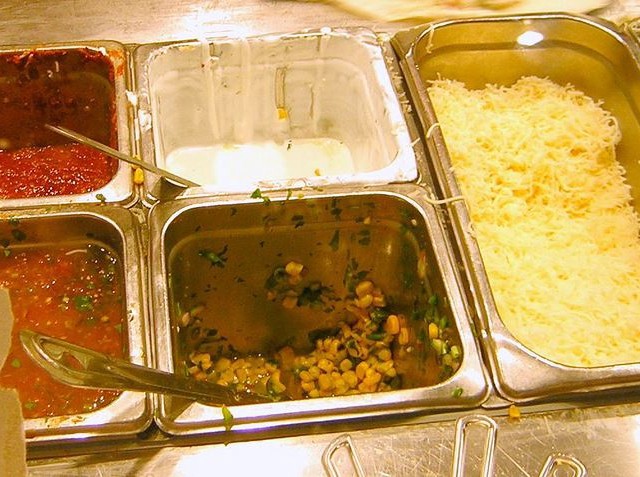
Last week, I sent a Chipotle survey to 100 people. 64 of them responded. This is what they shared.
How do you order your Chipotle?
81.3% of people don’t know ordering online is the way to go.
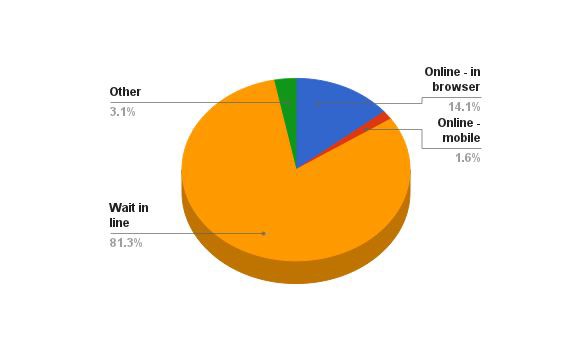
How long do you wait for your Chipotle?
People don’t like waiting more than 10 minutes for the perfect lunch.
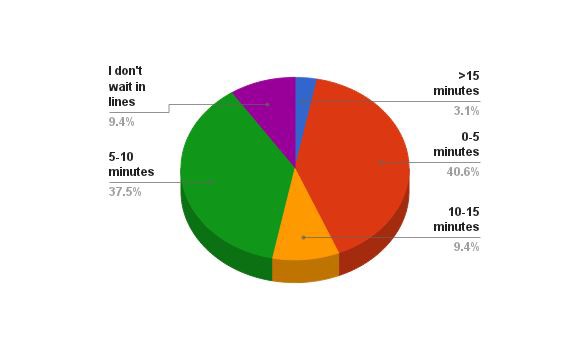
What form does your Chipotle order take?
In which I learned that people actually order the tacos. [Ed note: This is shocking: a Midtown NYC Chipotle is no more burrito place than Shake Shack is a hot dog place, or Starbucks is a sandwich shop. Is this a paleo thing, a carb thing, a calorie-count-on-the-menu thing? As New York goes, so goes the nation? Surely there are high-level meetings about this happening at Chipotle HQ.]
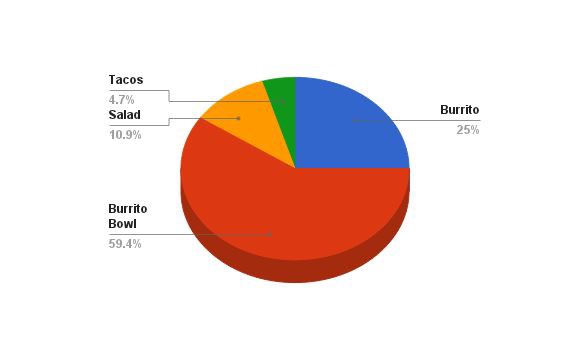
Main ingredient?
Veggies at #2! Who’d have thunk? I hadn’t thunk. Good for veggies.
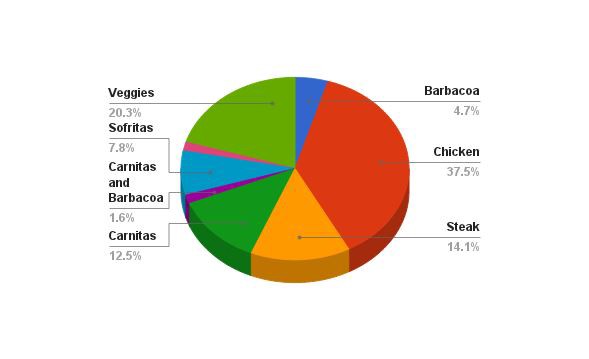
What kind of beans?
9.4% of people live dangerously.
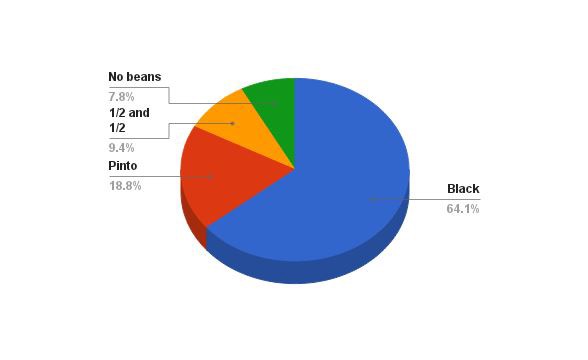
What kind of rice?
A surprisingly even split, complete with an even more surprising number of carb-free weirdos.
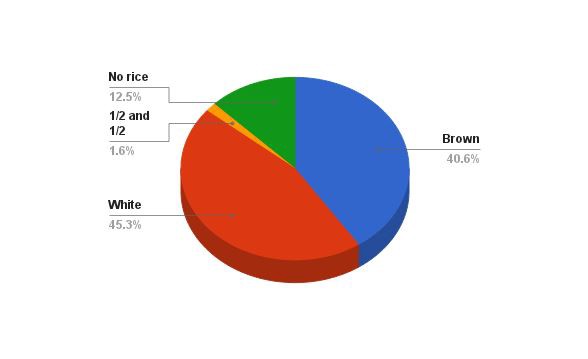
Guac? It’s extra.
60.9% of people don’t mind throwing money into the trash can.
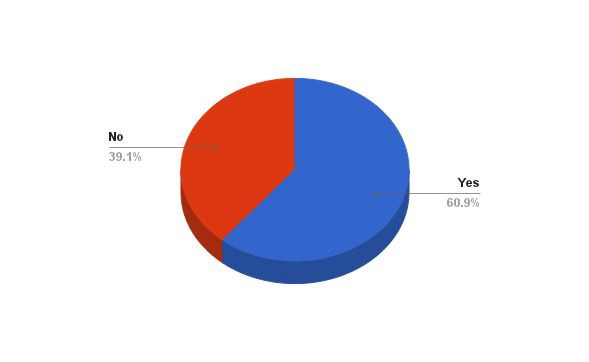
Have you ever ordered a margarita?
I ordered a margarita once, but it was before they started selling the fancy Patron ones. And I don’t think I would pay for a fancy Patron one at a Chipotle.
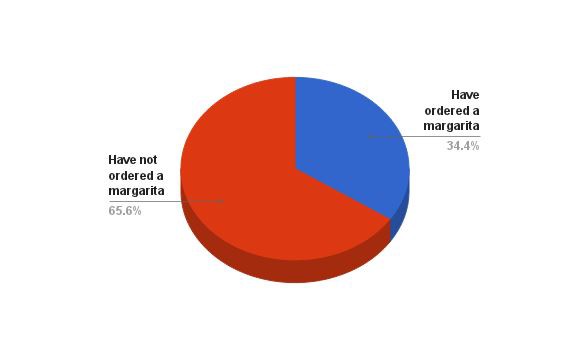
Dine in or takeout?
I enjoy eating Chipotle at my desk at lunch. I enjoy gchatting and clicking through various links on the internet while scooping the contents of my burrito bowl with the chips I bought for $1 extra. I enjoy the feeling of total satisfaction when I take the last bite and realize that my lunch was, indeed, perfect.
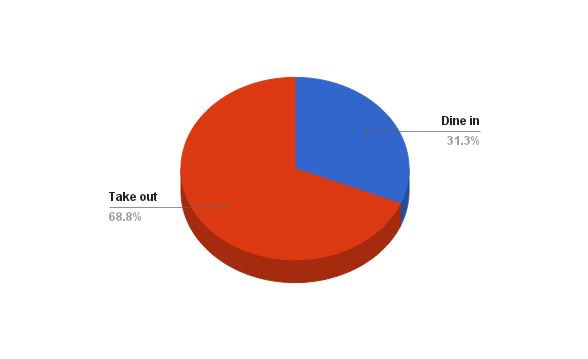
How often do you go to Chipotle?
34.4%!!!!! 34.4%??????!??!?!?!?!?!?!?!??!?!
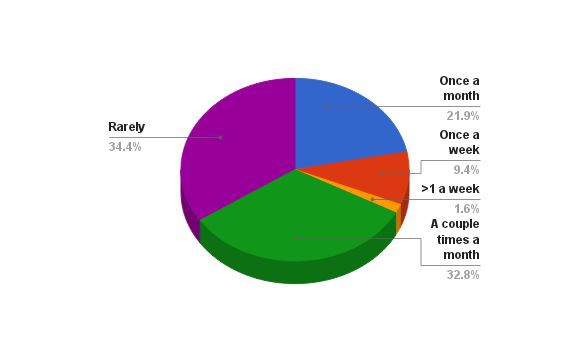
Selected quotes from respondents:
“If i work from home i sometimes order chips with my burrito bowl but would never do that at work because that is monster behavior.” — B.D.
“The burritos have so many calories that going to Chipotle is signing up for guilt, at least inside my head it is.” — R.J.
“THE PACE OF THE ORDERING PROCESS MAKES ME SO ANXIOUS I COULD DIE.” — J.R.
“It’s good but I kinda don’t get why it’s a Big Deal? But I don’t eat much fast food, so there’s that. Damn. Now I’m hungry for a margarita. (Didn’t know they served those! Maybe I’ll try to understand the Big Deal now?)” — J.K.
“Extra $ for guac is crazy, not worth it. It sorta enrages me.” — Anon
“Chipotle is garbage but so am I and I eat garbage.” — D.D.
“I LOVE CHIPOTLE AND EVERYTHING THAT MAKE IT FUN. IM A VERY HAPPY PERSON. Sadly there are no Chipotles near my work or home, but I have it any time I find myself near one, and I’m hungry. Guac!” — R.H.
“I live in Manhattan, but tend to avoid Chipotles here and only visit them when I’m in the suburbs because they’re usually busy on a workday lunch hour rush when it occurs to me that I might be interested in eating a burrito bowl. So my strat isn’t as aggressive or proactive as it probably could be. I like a mellow, strat-free burrito-until-I-feel-like-I’m-going-to-vomit experience. Also, the chips and guac rule!” — C.F.
“I used to eat at Chipotle 1–3 times a week, for like a year. I ate myself out of it, went off for a while, and now I’m back to once a month. But man is it delicious. Everyone I know goes through that addiction phase at some point..” — V.S.
“While I rarely partake in them, the margaritas are one of the most underappreciated items on offer — and they’re not even off-menu. They’re pretty large, and more importantly, strong. Plus, most people would never expect that you had a boozy lunch when you’re seemingly only dipping out to go to Chipotle.” — J.F.
And, finally:
“I actually hate Chipotle, and I don’t care who knows it.” — MEREDITH HAGGERTY @MANYMANYWORDS
Bobby Finger orders however he pleases.
(Image from Animakitty)
Who Looks Out For The Bodega Rides?
by Natalie McMullen
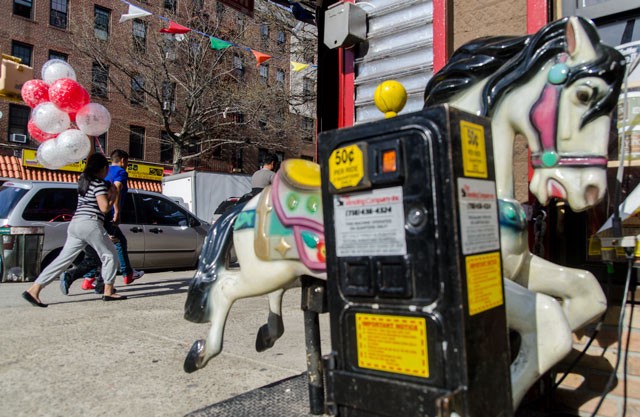
If you’ve ever wondered about the inanimate creatures that stand guard outside bodegas, the company responsible is The Vending Company Inc., New York’s Official Sentry of Coin Operated Kiddie Rides.
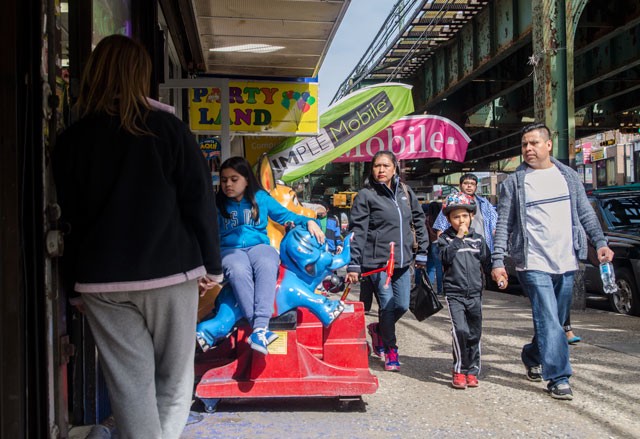
“We’re very much dependent on nice weather, and so every time it’s a rainy day, you don’t see a smile on my face,” Mark Goldberg, the manager, said. “Obviously when it’s rainy and it’s extremely cold and snowy, we don’t do any business. We sit around and play cards.”
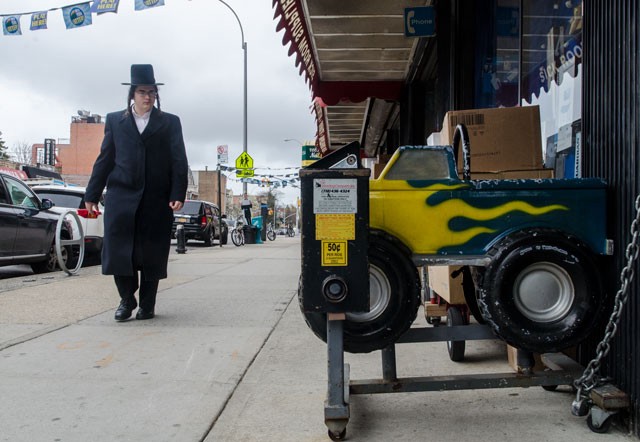
Operating half the year isn’t the only struggle for the 30-year-old business. “People don’t even understand. It’s extremely difficult. Moving and picking up, and stores closing and opening, and problems with kids sticking stuff inside the coin slot trying to get a free ride. I can’t tell you the amount of problems you can have.”
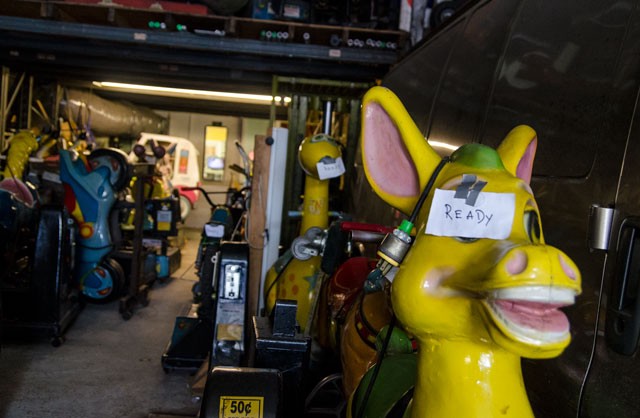
“The industry has changed dramatically,” said Goldberg. “Those manufacturers can no longer support the challenges of the economy. In order to make rides, you gotta be selling them.” Goldberg declined to say how many rides he maintains around the city: “I can’t give you that information. I don’t really know who you are. We’re getting into some sticky areas. They’re around the boroughs.”
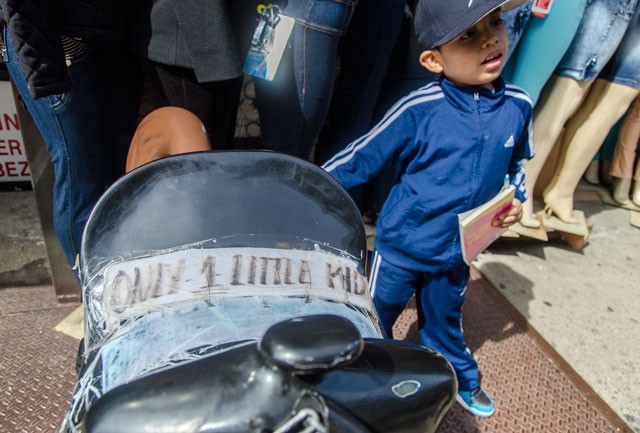
The modest Brooklyn shop, which provides rides to locations in every borough free of charge in return for a share of the profits, services and maintains the machines on site. “I haven’t bought a new ride in a long, long time. We can make the rides here practically look brand new. We know how to refurbish the stuff here better than the manufacturer.”
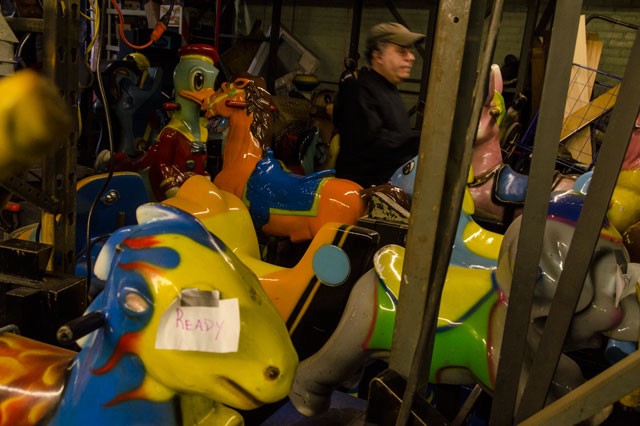

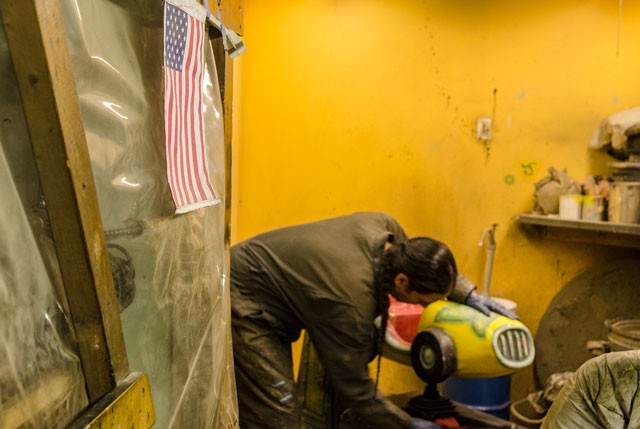
Javier Agredo has been the Vending Company’s resident artist for the past 12 years. Agredo said he used to paint more elaborate designs, but with the rides requiring touch-ups every year or two, these days he prefers to keep things simple.
Making sure the rides run tickety-boo is Alex Shneyyer, an employee of 17 years — no inconsequential role, considering Goldberg occasionally receives calls from distraught mothers whose kids want answers. “What happened to the Donald Duck? My daughter’s looking for it. She’s like flipping out. She doesn’t see it here anymore. She sees some other character there. She’s having a withdrawal.”
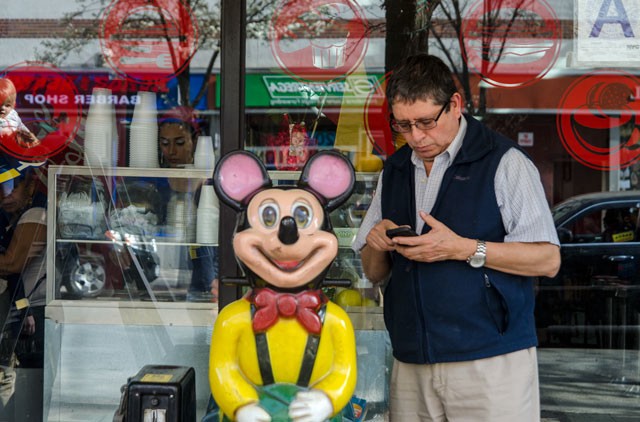
Goldberg’s phone also rang off the hook when the price increased from 25 to 50 cents. “We got a lot of screams. Frankly, 50 cents is not enough, but we’re dealing with it at this particular point. When somebody calls me up and says, ‘How come you raised the rides to 50 cents?’ I say, ‘Well it’s been a quarter for 25 years.’ Gas in 1974 was 53 cents a gallon. Now it’s $3.50 a gallon.”
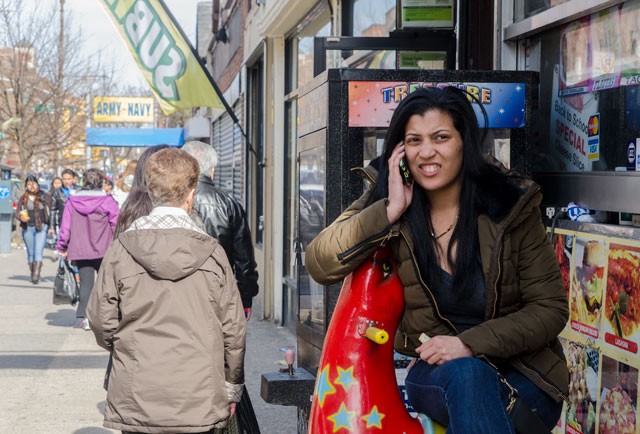
While the rides may look like they’re from a bygone era — some might even call them “good old-fashioned nightmare fuel” — Goldberg says they’re classics. “The thing about rides is they never go out of style. There’s always children being born, thanks be to God. So when they see some ride in the street, they naturally want to get on it. So they tell their parent or guardian — sometimes they don’t even say it, they just cry it — and of course any mother or father or guardian will have it fit in their heart to just give the child a ride.”
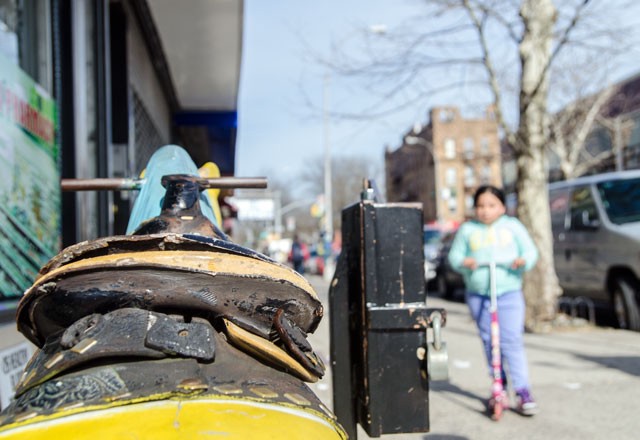
Natalie McMullen is a street photographer, culture critic and food writer. She is an archivist of the resonant, a nerdy polisher of words, and a lifelong scholar on love and relationships. She is currently resident photographer at The Awl.
